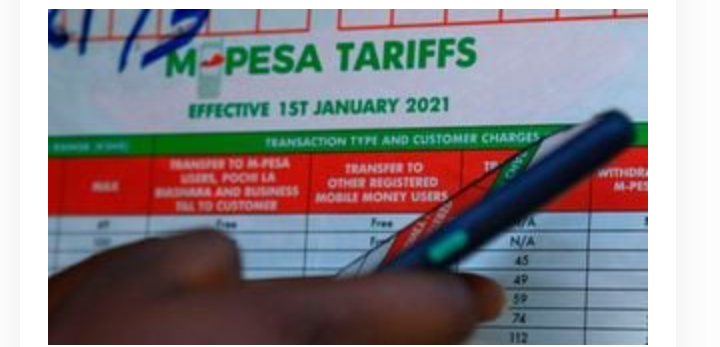
Treasury Set To Cut Down MPesa Transfer Charges…
The Treasury is working on a proposal to cut M-Pesa transfer charges in a move that looks set to hurt Safaricom’s revenues from a service that makes more money than voice.
Treasury Cabinet Secretary Ukur Yatani told the Senate that there was need to make M-Pesa cheaper at a time when the mobile money platform has become deeply entrenched in Kenyans’ business and daily lives.
The push to review the charges will add to the battles that Safaricom is facing over its dominance, including the move to cut calling rates and calls to have it broken up and forced to run M-Pesa as a separate business from the telecoms service.
Mr Yatani said the Treasury was aware of the rising concerns among consumers and small businesses over M-Pesa’s transaction charges.
M-Pesa accounted for about 99.9 percent of the value of mobile money transactions, underlining the entrenchment of the platform in Kenya’s economy.
“Another source of concern with mobile money stems from the perception both by consumers and small businesses that the rents from digital technology are unfairly accruing to Safaricom Plc,” said Mr Yatani in his presentation to the Senate on Safaricom’s dominance.
“This is in the area of unconscionable/excessive rates and Safaricom being a critical trading partner for SMEs and consumers… We will soon be presenting some proposed amendments to deal with this scenario.”
The full cost, including sending and withdrawal, of transferring Sh5,000 on M-Pesa is Sh159 while Airtel charges Sh75.
It costs Sh296 to transfer Sh25,000 on M-Pesa and Sh160 on Airtel.
Safaricom is Kenya’s biggest firm by market capitalisation and dwarfs the two other operators in the mobile market — Airtel Kenya and Telkom Kenya.
The smaller operators have long argued that Safaricom enjoys a dominant position because it accounts for 90 percent of revenues in areas such as mobile money transfer, voice calls and text messages.
Safaricom has consistently rejected the accusations of dominance amid repeated parliamentary petitions for probe of market abuse by rivals.
Data from the Central Bank of Kenya (CBK) shows that M-Pesa grew its share of the value of mobile money transactions in the last three years to hit Sh2.206 trillion (99.9 percent) out of the total of Sh2.208 trillion worth of transactions in 2021.
M-Pesa’s growth ate into the market of Airtel Money and Telkom’s T-Kash in the period, with their shares dropping to 0.2 percent and 0.1 percent respectively.
Safaricom’s control of the market has prompted a push for regulatory changes by its rivals who allege that the telco is abusing dominance.
The Treasury in earlier reports warned that the collapse of the M-Pesa service would cause widespread disruption in the economy.
The Treasury said a technology disaster affecting the M-Pesa-dominated mobile transactions was now a fiscal risk, placing the money transfer systems among other potential threats to the economy that are watched keenly by policy wonks.
The report noted that various financial products have been leveraged on the M-Pesa payment channel, increasing the inter-linkages between the technology and the banking sector.
The Treasury’s comment on M-Pesa charges emerged in a period when the platform has overtaken voice to become the biggest revenue earner for Safaricom, underlining the growth of the financial service that was launched on March 6, 2007.
M-Pesa has since evolved from a basic SIM card-based money transfer application into a fully-fledged financial service offering loans and savings in conjunction with local banks, plus merchant payment services.
Safaricom’s Lipa na M-Pesa service, which was launched in June 2013, has aggressively recruited merchants across the country, including large and small businesses such as fuel stations, supermarkets, corner shops and eateries.
In the year ended March 2021, M-Pesa revenues stood at Sh82.64 billion, ahead of voice at Sh82.55 billion.
Overall, the telco recorded revenues of Sh264 billion, yielding a net profit of Sh68.68 billion.
In 2020, voice contributed Sh86.5 billion to the telco’s revenue haul, ahead of M-Pesa’s Sh84.4 billion.
Although the Treasury is now turning its guns on Safaricom, it has been a major beneficiary of the company’s profit machine through taxes and dividends.
The Treasury is the second-biggest shareholder in Safaricom with a stake of 35 percent behind multinationals Vodacom Group Limited and Vodafone Group Plc, which together own 40 percent.
In the year ended March 2021, the government earned a dividend of Sh19.21 billion, after the telco paid out a total of Sh1.37 per share in the period.
The Treasury is also due to pick up another payout of Sh8.9 billion at the end of this month after the telco announced an interim dividend of Sh0.64 per share in February, payable on March 31.
The government also charges excise on mobile money transfer fees at 12 percent, which has been a contributor to the charges going up in recent years.
Meanwhile, Safaricom also pays direct corporate taxes to the government, amounting to Sh24.9 billion in the year to March 2021.
The CBK has also been weighing in on the relatively high cost of mobile money transactions, saying that it can force the charges down if it launches its digital version of the shilling.
“Assuming the central bank charges no fees for CBDC [central bank digital currency], it would facilitate small-value online transactions given relatively low (or no) associated fees compared to the current payment charges,” said the CBK in a discussion paper issued last month on the proposed digital currency.
The financial services regulator has also been pushing for the interoperability of the merchant payment platforms of Safaricom and Airtel, which it hopes would help ease the dominance of Safaricom in this space.
